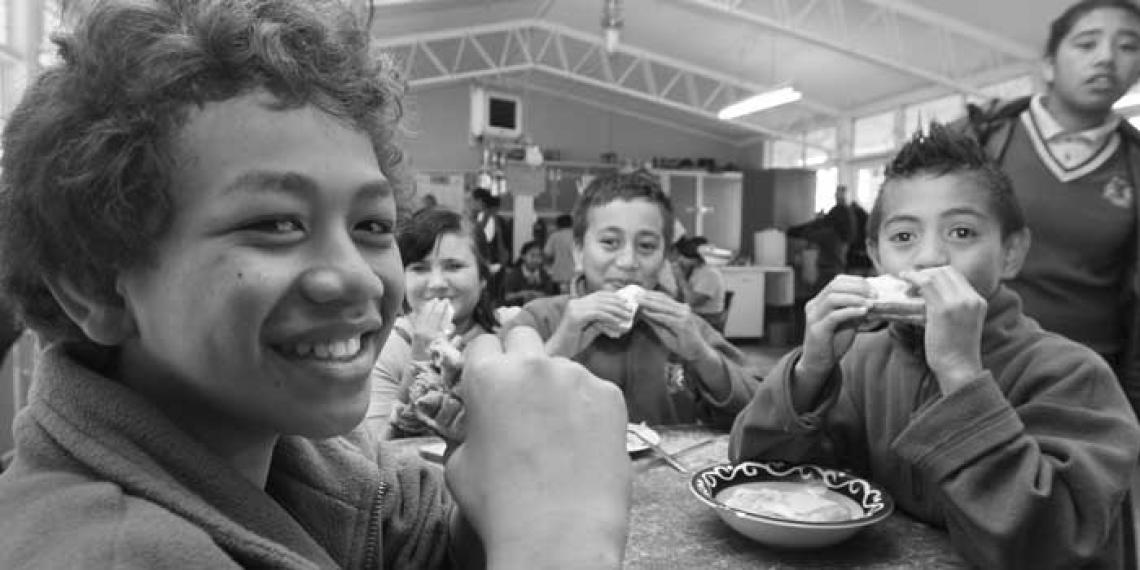You are here
Make friends with the poor

Recent TV current affairs programmes, news articles and independent expert investigations by the Children’s Commissioner have brought public attention to the reality of child poverty.
We have learned that Kiwi children are going to school without breakfast and lunch. This makes it hard for them to concentrate and learn, potentially affecting their long-term education and employment prospects. If something isn’t done, this problem will not only affect today’s generation of children, but successive generations, as poverty becomes more and more entrenched in families and communities.
New Zealanders have responded with concern and care, donating money and food to schools and national organisations like Kiwican to feed these hungry children. While this response is heartening, too many children are still going to school without lunch or breakfast.
Following the report of the Children’s Commissioner’s Expert group on poverty a number of community groups—including The Salvation Army—supported the introduction of fully State-funded breakfast and lunch programmes into decile one to four schools.
As part of support for this change, politicians, trade unions and community groups combined recently to launch ‘The Big Breakfast’ campaign, with a nutritious breakfast for over 2000 children. Sports, film and TV celebrities—including Shortland Street stars—helped serve this breakfast. As these celebrities moved around The Big Breakfast, kids crowded to touch their heroes and get their autographs. I was fascinated to see that the longest queue was to reach a group of Pacific Island and Maori police. Why would these kids see these young police as their heroes? I wondered.
I learned that this particular police unit was concentrated around Otara and spent its time getting to know the kids in their area. The excitement I saw on the kids’ faces showed how successfully the police have built relationships. As a result, these children have an adult leadership model they can look up to and perhaps emulate. My guess is relationships like these will give these South Auckland kids a greater chance of being good citizens free from criminal activities and substance abuse. Relationships with their police heroes will likely strengthen these kids’ personal values and ensure another adult person in the community is supporting them.
It wasn’t only the police that had a positive relationship with these South Auckland kids. I could see that their teachers were also pretty special. So there’s a good chance with these sorts of relationships and mentors available, some of these kids can overcome their present poor social circumstance and environments in which social injustice often plays a big part.
In pursuing a fair and just society, relationships are crucial. Social justice cannot be just a biblical value we affirm, a truth we believe in, or a set of ideas or philosophies we commit to. For social justice to be an authentic value in our lives, it needs to be lived out in relationships of friendship and care that envelop the way we live.
It is valuable to talk, write and speak about themes of social justice, but unless we take the time to know and relate to people who are experiencing injustice, our ideas remain academic and distant. We can be speaking social justice words and advocating for social change, yet be removed from those impacted by injustice. As a result, we can appear to those suffering injustice to be merely paternalistic and givers of charity. Aboriginal activist Lilla Watson says, ‘If you have come to help me, you are wasting your time. But if you have come because your liberation is bound up with mine, then let us work together.’
Social justice ministry and action certainly involves discussing and understanding concepts of love and justice as taught in the Bible. But it is more than teaching, advocacy and gifts of money; social justice is about relationships with those who suffer injustice. It is about seeking out those for whom injustice is a way of daily life, forming relationships of trust that stand alongside, support and empower them to obtain justice for themselves.
By Major Campbell Roberts, Director of The Salvation Army’s Social Policy and Parliamentary Unit.